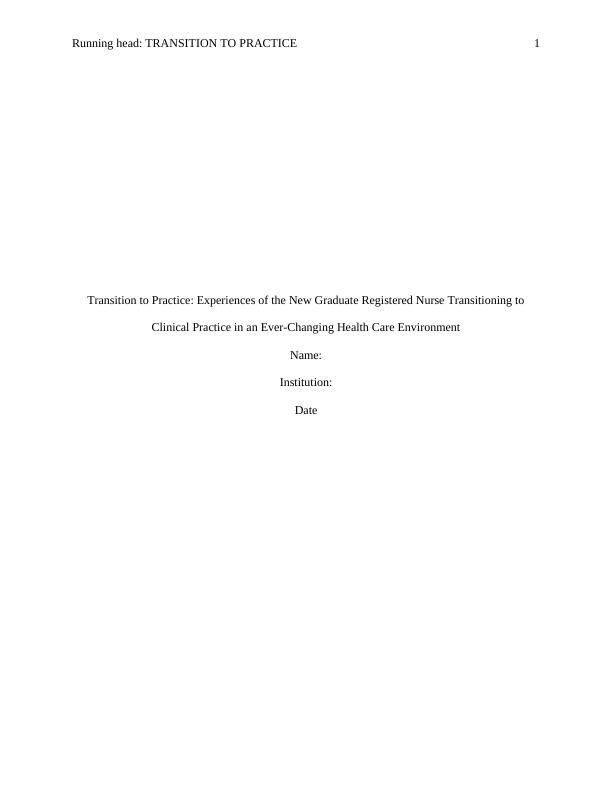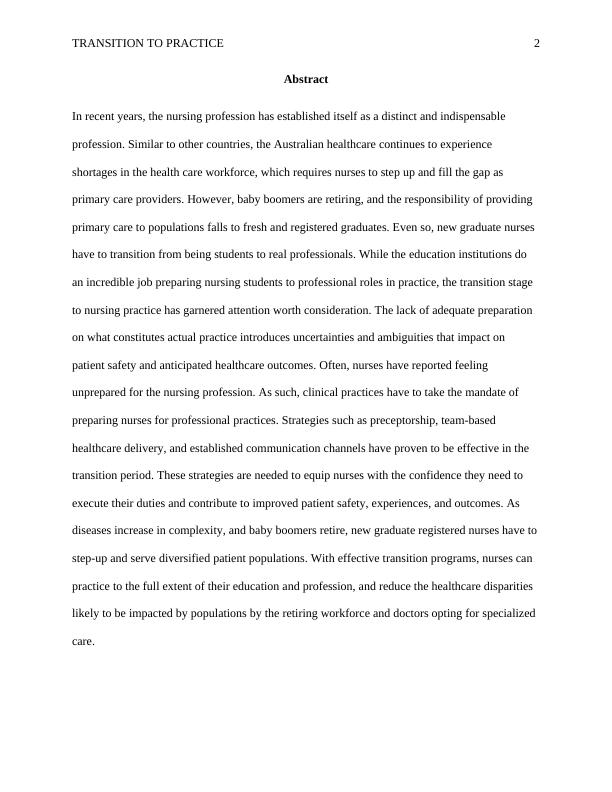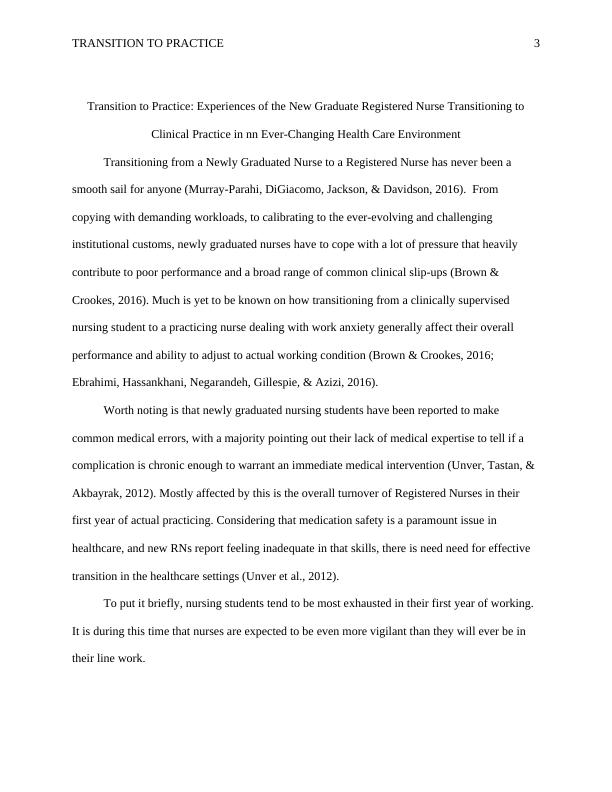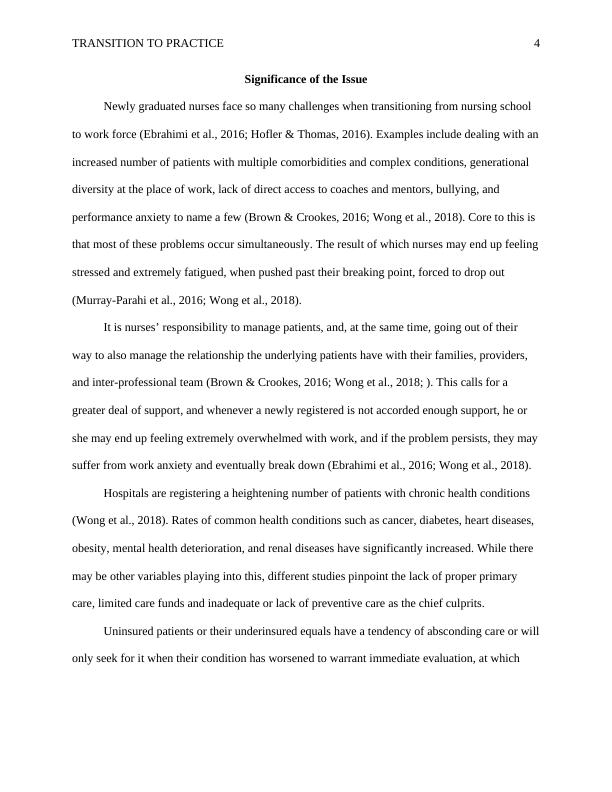Transition to Practice: Experiences of the New Graduate Registered Nurse
Added on 2023-06-04
12 Pages3234 Words234 Views
Running head: TRANSITION TO PRACTICE 1
Transition to Practice: Experiences of the New Graduate Registered Nurse Transitioning to
Clinical Practice in an Ever-Changing Health Care Environment
Name:
Institution:
Date
Transition to Practice: Experiences of the New Graduate Registered Nurse Transitioning to
Clinical Practice in an Ever-Changing Health Care Environment
Name:
Institution:
Date

TRANSITION TO PRACTICE 2
Abstract
In recent years, the nursing profession has established itself as a distinct and indispensable
profession. Similar to other countries, the Australian healthcare continues to experience
shortages in the health care workforce, which requires nurses to step up and fill the gap as
primary care providers. However, baby boomers are retiring, and the responsibility of providing
primary care to populations falls to fresh and registered graduates. Even so, new graduate nurses
have to transition from being students to real professionals. While the education institutions do
an incredible job preparing nursing students to professional roles in practice, the transition stage
to nursing practice has garnered attention worth consideration. The lack of adequate preparation
on what constitutes actual practice introduces uncertainties and ambiguities that impact on
patient safety and anticipated healthcare outcomes. Often, nurses have reported feeling
unprepared for the nursing profession. As such, clinical practices have to take the mandate of
preparing nurses for professional practices. Strategies such as preceptorship, team-based
healthcare delivery, and established communication channels have proven to be effective in the
transition period. These strategies are needed to equip nurses with the confidence they need to
execute their duties and contribute to improved patient safety, experiences, and outcomes. As
diseases increase in complexity, and baby boomers retire, new graduate registered nurses have to
step-up and serve diversified patient populations. With effective transition programs, nurses can
practice to the full extent of their education and profession, and reduce the healthcare disparities
likely to be impacted by populations by the retiring workforce and doctors opting for specialized
care.
Abstract
In recent years, the nursing profession has established itself as a distinct and indispensable
profession. Similar to other countries, the Australian healthcare continues to experience
shortages in the health care workforce, which requires nurses to step up and fill the gap as
primary care providers. However, baby boomers are retiring, and the responsibility of providing
primary care to populations falls to fresh and registered graduates. Even so, new graduate nurses
have to transition from being students to real professionals. While the education institutions do
an incredible job preparing nursing students to professional roles in practice, the transition stage
to nursing practice has garnered attention worth consideration. The lack of adequate preparation
on what constitutes actual practice introduces uncertainties and ambiguities that impact on
patient safety and anticipated healthcare outcomes. Often, nurses have reported feeling
unprepared for the nursing profession. As such, clinical practices have to take the mandate of
preparing nurses for professional practices. Strategies such as preceptorship, team-based
healthcare delivery, and established communication channels have proven to be effective in the
transition period. These strategies are needed to equip nurses with the confidence they need to
execute their duties and contribute to improved patient safety, experiences, and outcomes. As
diseases increase in complexity, and baby boomers retire, new graduate registered nurses have to
step-up and serve diversified patient populations. With effective transition programs, nurses can
practice to the full extent of their education and profession, and reduce the healthcare disparities
likely to be impacted by populations by the retiring workforce and doctors opting for specialized
care.

TRANSITION TO PRACTICE 3
Transition to Practice: Experiences of the New Graduate Registered Nurse Transitioning to
Clinical Practice in nn Ever-Changing Health Care Environment
Transitioning from a Newly Graduated Nurse to a Registered Nurse has never been a
smooth sail for anyone (Murray‐Parahi, DiGiacomo, Jackson, & Davidson, 2016). From
copying with demanding workloads, to calibrating to the ever-evolving and challenging
institutional customs, newly graduated nurses have to cope with a lot of pressure that heavily
contribute to poor performance and a broad range of common clinical slip-ups (Brown &
Crookes, 2016). Much is yet to be known on how transitioning from a clinically supervised
nursing student to a practicing nurse dealing with work anxiety generally affect their overall
performance and ability to adjust to actual working condition (Brown & Crookes, 2016;
Ebrahimi, Hassankhani, Negarandeh, Gillespie, & Azizi, 2016).
Worth noting is that newly graduated nursing students have been reported to make
common medical errors, with a majority pointing out their lack of medical expertise to tell if a
complication is chronic enough to warrant an immediate medical intervention (Unver, Tastan, &
Akbayrak, 2012). Mostly affected by this is the overall turnover of Registered Nurses in their
first year of actual practicing. Considering that medication safety is a paramount issue in
healthcare, and new RNs report feeling inadequate in that skills, there is need need for effective
transition in the healthcare settings (Unver et al., 2012).
To put it briefly, nursing students tend to be most exhausted in their first year of working.
It is during this time that nurses are expected to be even more vigilant than they will ever be in
their line work.
Transition to Practice: Experiences of the New Graduate Registered Nurse Transitioning to
Clinical Practice in nn Ever-Changing Health Care Environment
Transitioning from a Newly Graduated Nurse to a Registered Nurse has never been a
smooth sail for anyone (Murray‐Parahi, DiGiacomo, Jackson, & Davidson, 2016). From
copying with demanding workloads, to calibrating to the ever-evolving and challenging
institutional customs, newly graduated nurses have to cope with a lot of pressure that heavily
contribute to poor performance and a broad range of common clinical slip-ups (Brown &
Crookes, 2016). Much is yet to be known on how transitioning from a clinically supervised
nursing student to a practicing nurse dealing with work anxiety generally affect their overall
performance and ability to adjust to actual working condition (Brown & Crookes, 2016;
Ebrahimi, Hassankhani, Negarandeh, Gillespie, & Azizi, 2016).
Worth noting is that newly graduated nursing students have been reported to make
common medical errors, with a majority pointing out their lack of medical expertise to tell if a
complication is chronic enough to warrant an immediate medical intervention (Unver, Tastan, &
Akbayrak, 2012). Mostly affected by this is the overall turnover of Registered Nurses in their
first year of actual practicing. Considering that medication safety is a paramount issue in
healthcare, and new RNs report feeling inadequate in that skills, there is need need for effective
transition in the healthcare settings (Unver et al., 2012).
To put it briefly, nursing students tend to be most exhausted in their first year of working.
It is during this time that nurses are expected to be even more vigilant than they will ever be in
their line work.

TRANSITION TO PRACTICE 4
Significance of the Issue
Newly graduated nurses face so many challenges when transitioning from nursing school
to work force (Ebrahimi et al., 2016; Hofler & Thomas, 2016). Examples include dealing with an
increased number of patients with multiple comorbidities and complex conditions, generational
diversity at the place of work, lack of direct access to coaches and mentors, bullying, and
performance anxiety to name a few (Brown & Crookes, 2016; Wong et al., 2018). Core to this is
that most of these problems occur simultaneously. The result of which nurses may end up feeling
stressed and extremely fatigued, when pushed past their breaking point, forced to drop out
(Murray‐Parahi et al., 2016; Wong et al., 2018).
It is nurses’ responsibility to manage patients, and, at the same time, going out of their
way to also manage the relationship the underlying patients have with their families, providers,
and inter-professional team (Brown & Crookes, 2016; Wong et al., 2018; ). This calls for a
greater deal of support, and whenever a newly registered is not accorded enough support, he or
she may end up feeling extremely overwhelmed with work, and if the problem persists, they may
suffer from work anxiety and eventually break down (Ebrahimi et al., 2016; Wong et al., 2018).
Hospitals are registering a heightening number of patients with chronic health conditions
(Wong et al., 2018). Rates of common health conditions such as cancer, diabetes, heart diseases,
obesity, mental health deterioration, and renal diseases have significantly increased. While there
may be other variables playing into this, different studies pinpoint the lack of proper primary
care, limited care funds and inadequate or lack of preventive care as the chief culprits.
Uninsured patients or their underinsured equals have a tendency of absconding care or will
only seek for it when their condition has worsened to warrant immediate evaluation, at which
Significance of the Issue
Newly graduated nurses face so many challenges when transitioning from nursing school
to work force (Ebrahimi et al., 2016; Hofler & Thomas, 2016). Examples include dealing with an
increased number of patients with multiple comorbidities and complex conditions, generational
diversity at the place of work, lack of direct access to coaches and mentors, bullying, and
performance anxiety to name a few (Brown & Crookes, 2016; Wong et al., 2018). Core to this is
that most of these problems occur simultaneously. The result of which nurses may end up feeling
stressed and extremely fatigued, when pushed past their breaking point, forced to drop out
(Murray‐Parahi et al., 2016; Wong et al., 2018).
It is nurses’ responsibility to manage patients, and, at the same time, going out of their
way to also manage the relationship the underlying patients have with their families, providers,
and inter-professional team (Brown & Crookes, 2016; Wong et al., 2018; ). This calls for a
greater deal of support, and whenever a newly registered is not accorded enough support, he or
she may end up feeling extremely overwhelmed with work, and if the problem persists, they may
suffer from work anxiety and eventually break down (Ebrahimi et al., 2016; Wong et al., 2018).
Hospitals are registering a heightening number of patients with chronic health conditions
(Wong et al., 2018). Rates of common health conditions such as cancer, diabetes, heart diseases,
obesity, mental health deterioration, and renal diseases have significantly increased. While there
may be other variables playing into this, different studies pinpoint the lack of proper primary
care, limited care funds and inadequate or lack of preventive care as the chief culprits.
Uninsured patients or their underinsured equals have a tendency of absconding care or will
only seek for it when their condition has worsened to warrant immediate evaluation, at which

End of preview
Want to access all the pages? Upload your documents or become a member.
Related Documents
Experiences of new graduate Registered Nurses transitioning to clinical practicelg...
|12
|3562
|222
New Nurse Experience During Transition from Academia to Practicelg...
|12
|3098
|281
Experiences of New Graduate Registered Nurse Transitioning To Clinical Practice in an EverChanging Health Care Environmentlg...
|13
|3356
|311
Critical Analysis Essay of a Case Study - Transition to Graduate Practicelg...
|7
|2404
|250
Registered Graduated Nurse Discussion 2022lg...
|9
|2246
|27
TRANSITION TO PROFESSIONAL PRACTICE EXPERIENCESlg...
|7
|1452
|28
